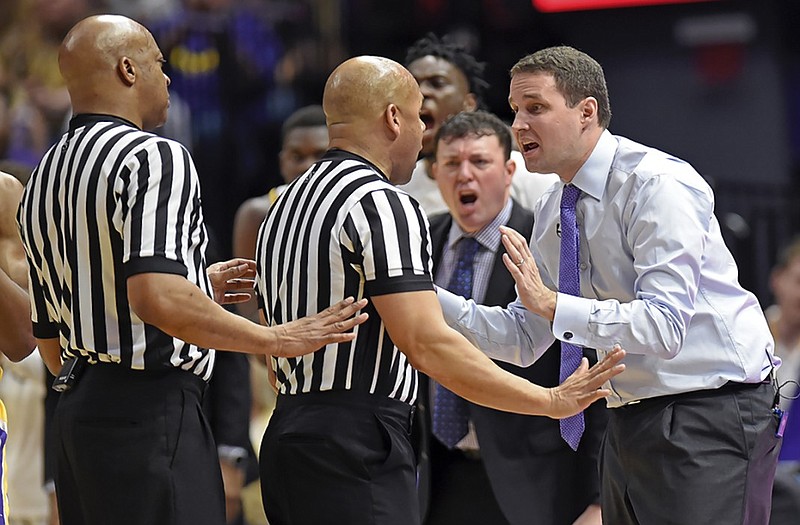Former University of Tennessee basketball great Ron Slay spent Saturday night helping Ensworth coach Ricky Bowers find a way to knock off McCallie in the Division II-AA state playoffs.
But Saturday afternoon found him watching the Volunteers' overtime road loss to LSU. Asked if he would have fouled a Tiger 75 feet from the bucket with six-tenths of a second on the clock - as UT's Grant Williams did, with that foul against the Tigers' Javonte Smart leading to the two free throws that decided LSU's 82-80 victory - Slay replied, "I hope not."
"But I'd also hope the officials wouldn't call a foul 75 feet from the basket with less than a second to play in a tie game," he continued. "Let the players decide it in a second overtime."
A lot of Big Orange fans would no doubt support Slay's reasoning, and some officials might as well. But Williams did foul Smart, and one could also argue a foul should be a foul whether it's six-tenths of a second after the opening tip or that amount of time before the final whistle.
That doesn't mean the three-man crew that officiated the UT-LSU game - Anthony Jordan, Bart Lenox and Olandis Poole - shouldn't come in for some heavy criticism for everything but that late foul, however. Thanks to that trio going to the replay monitor for everything from fouls to clock problems to block-charge reviews, a game that started at noon often seemed as if it wouldn't end until prime time.
Nor was it just the number of reviews, but also, if not more so, the length of time they spent on those reviews.
ESPN analyst Jay Bilas zinged the trio in a tweet that read: "The officials in the Tennessee-LSU game have watched more of the game on a replay monitor than live. Replay is taking way too long. The rule needs to change."
Inside the Pete Maravich Assembly Center, ESPN color commentator Dick Vitale complained early and often that there were too many replays, that they lasted far too long and that it was becoming a "crutch." He said reviews need to be confined to "one minute," and that if the call couldn't be overturned in a minute, then the original ruling should stand.
A friend attending the Ensworth-McCallie game said he agreed with Vitale, but not inside the final two minutes, that in that circumstance the officials should take as long as needed to get it right.
It's a fair point, but why are the final two minutes made to be more important than the first 38? Block-charge calls alter games long before the final 120 seconds. An NCAA review of block-charge calls a few years ago even revealed they were called wrong close to 60 percent of the time.
Why not review all of them for a maximum of 60 seconds with someone back in a Wizard of Oz-like control booth in another city - such as Birmingham, Alabama, in the Southeastern Conference's case - helping the courtside officials?
A confession is in order here. I think the block-charge problem is the worst thing in the sport other than the NCAA tournament selection committee's unwillingness to strictly follow the S-curve in its seeding process.
First of all, unless the offensive player lowers his shoulder to gain an unfair physical advantage over the defender, if the defender's feet - not foot, feet, as in plural - aren't both planted prior to the offensive player committing his move toward the basket, it's a block. At least it should be.
Beyond that, a block is rarely about sound defense. If it were, we'd be more worried about principle of verticality than feet because the defender would go airborne to contest the shot. No, most blocks are about hoping the official sides with the defender rather than the offensive player.
Because of that, a charge needs to be a turnover and a block needs to remain a foul, which would allow any official not certain of what to call to err on the side of a turnover rather than a foul.
That said, if all block-charge replays were limited to a 60-second review, maybe they'd get them right more often.
However, what's most needed is for all these reviews to take less time. Almost none of the reviews in the UT-LSU game needed more than 20 seconds to come to the correct conclusion. They were almost instantly confirmed, and of those that needed a bit more video study, they should have easily been decided inside of one minute instead of running three or four minutes on at least four occasions.
Furthermore, the replays, no matter how long they last, take all rhythm and momentum out of a game that is all about rhythm and momentum. It's not right that a player may have to wait four or five minutes to shoot a free throw, nor is it good if a team on the short end of a 10-0 run gets a free timeout or two to settle itself.
And what of the team inside that final minute that is out of timeouts but gets a free one during a replay? How fair is that to the other team? When a review is underway, both teams need to go to the corners that are farthest from their benches, with the only people from their benches visiting them being managers bringing water.
But to return to the end of the UT-LSU game: The officials didn't beat the Vols. The Vols beat the Vols by inexplicably fouling 75 feet from the basket with less than a second to go.
Blame it on bad luck or bad judgment; just don't blame the officials for that final frustrating foul call.
Contact Mark Wiedmer at mwiedmer@timesfreepress.com.

